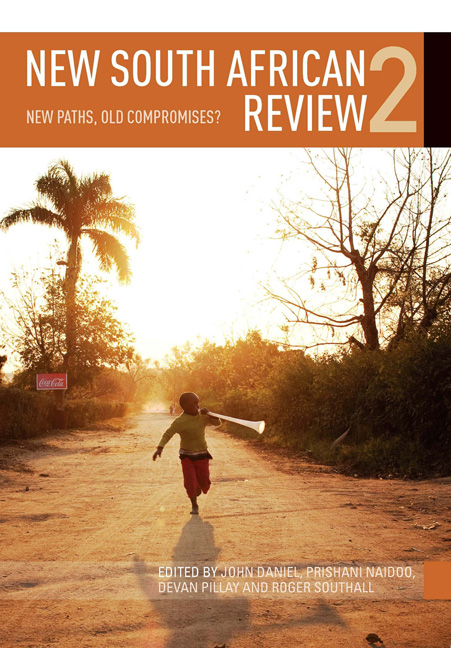Book contents
- Frontmatter
- Contents
- Preface
- Introduction: New paths, old (com)promises?
- PART 1 POLITICS AND INTERNATIONAL
- Introduction: The Zuma presidency: The politics of paralysis?
- Chapter 1 The Tripartite Alliance and its discontents: Contesting the ‘National Democratic Revolution’ in the Zuma era
- Chapter 2 The African National Congress and the Zanufication debate
- Chapter 3 Dancing like a monkey: The Democratic Alliance and opposition politics in South Africa
- Chapter 4 Democracy and accountability: Quo Vadis South Africa?
- Chapter 5 Civil society and participatory policy making in South Africa: Gaps and opportunities
- Chapter 6 Bring back Kaiser Matanzima? Communal land, traditional leaders and the politics of nostalgia
- Chapter 7 South Africa and ‘Southern Africa’: What relationship in 2011?
- PART 2 ECONOMY AND SOCIETY
- PART 3 ENVIRONMENT
- PART 4 MEDIA
- Contributors
- Index
Chapter 1 - The Tripartite Alliance and its discontents: Contesting the ‘National Democratic Revolution’ in the Zuma era
from PART 1 - POLITICS AND INTERNATIONAL
Published online by Cambridge University Press: 23 March 2018
- Frontmatter
- Contents
- Preface
- Introduction: New paths, old (com)promises?
- PART 1 POLITICS AND INTERNATIONAL
- Introduction: The Zuma presidency: The politics of paralysis?
- Chapter 1 The Tripartite Alliance and its discontents: Contesting the ‘National Democratic Revolution’ in the Zuma era
- Chapter 2 The African National Congress and the Zanufication debate
- Chapter 3 Dancing like a monkey: The Democratic Alliance and opposition politics in South Africa
- Chapter 4 Democracy and accountability: Quo Vadis South Africa?
- Chapter 5 Civil society and participatory policy making in South Africa: Gaps and opportunities
- Chapter 6 Bring back Kaiser Matanzima? Communal land, traditional leaders and the politics of nostalgia
- Chapter 7 South Africa and ‘Southern Africa’: What relationship in 2011?
- PART 2 ECONOMY AND SOCIETY
- PART 3 ENVIRONMENT
- PART 4 MEDIA
- Contributors
- Index
Summary
Despite increasingly shrill public spats between alliance partners since the 2009 elections, was John Kane-Berman, head of the South African Institute of Race Relations, correct to suggest that ‘staying in the alliance was the better strategy to push the political centre of gravity of the African National Congress (ANC) further to the left’ (Business Day, 31 January 2011)? Kane-Berman was lamenting the influence of the Congress of South African Trade Unions (Cosatu) over impending labour legislation, but his fears chimed with broader concerns from within the business community regarding future economic policy. Government's New Growth Path, launched in October 2010, suggests greater state intervention in the economy, and calls for the nationalisation of sectors of the economy are growing within the ANC.
Left critics, by contrast, argue that the alliance, through its National Democratic Revolution (NDR) ideological discourse, fulfils an important legitimating function. It glues together disparate social classes under the hegemony of conservative class interests – a coalition of white and emerging comprador black capital (enmeshed in ever-expanding networks of patronage and corruption), and a professional black middle class that has done rather well out of the post-apartheid dispensation. In other words, the organised working class are being deceived – by their leadership, also implicated in patronage politics – into supporting the ANC against their own class interests, and some believe that the time has come to build a ‘left opposition’ outside the alliance.
The alliance left, however, insist that since Jacob Zuma assumed the leadership of the ANC at the December 2007 Polokwane conference, space has opened for further contestation within the ANC and the government. To leave the alliance and build a left opposition outside it would, on the one hand, abandon that space to predatory right-wing forces and, on the other, relegate the left to the political fringe, no more than what ANC general secretary and SA Communist Party (SACP) chairperson Gwede Mantashe calls a ‘debating society’.
Alliance supporters also argue that, despite slow progress towards reducing inequality and eradicating poverty, the alliance remains essential to holding the centre together by preserving national coherence through an increasingly tension-ridden but nevertheless persistent ‘nonracial’ discourse, and preventing South Africa from splitting into a dangerously fractious contest over resources.
- Type
- Chapter
- Information
- New South African Review 2New paths, old compromises?, pp. 31 - 49Publisher: Wits University PressPrint publication year: 2012

